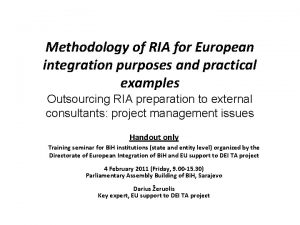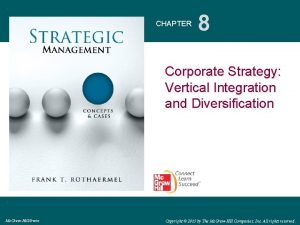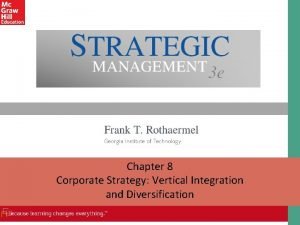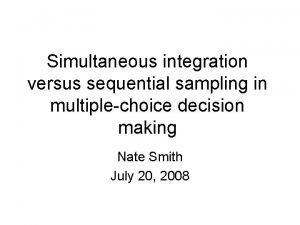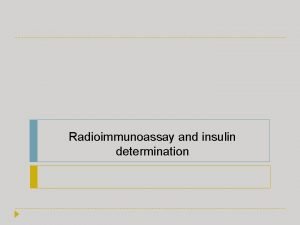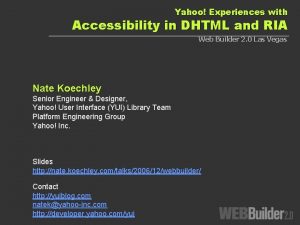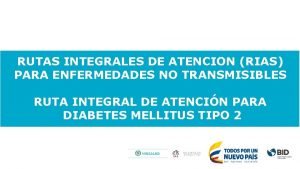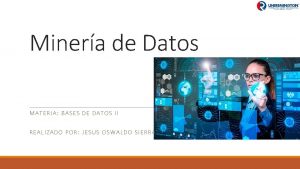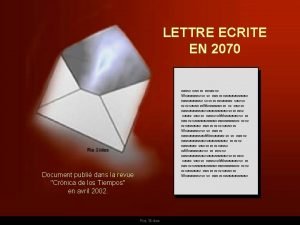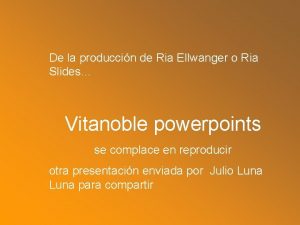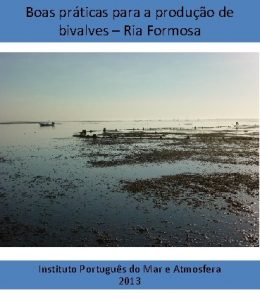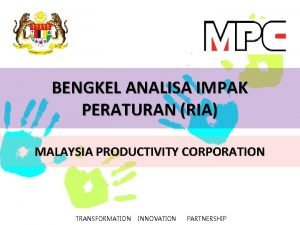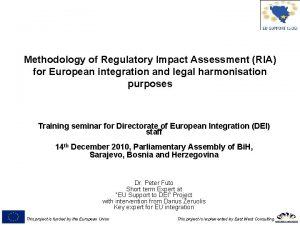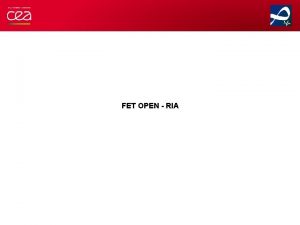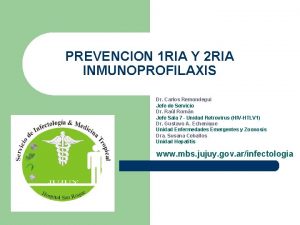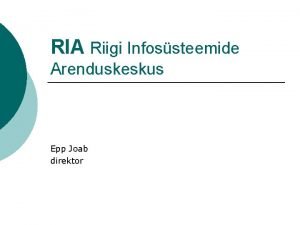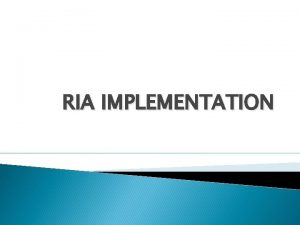Methodology of RIA for European integration purposes and

















- Slides: 17

Methodology of RIA for European integration purposes and practical examples Outsourcing RIA preparation to external consultants: project management issues Handout only Training seminar for Bi. H institutions (state and entity level) organized by the Directorate of European Integration of Bi. H and EU support to DEI TA project 4 February 2011 (Friday, 9. 00 -15. 30) Parliamentary Assembly Building of Bi. H, Sarajevo Darius Žeruolis Key expert, EU support to DEI TA project

Why and when outsourcing might be necessary? • When resources are not available in-house (at the state institutions), especially for solution of complex or unknown problems • For sectoral studies (when it is difficult to co-ordinate internally in line ministries) • To build or enlarge RIA expert community outside the state institutions • It can be used as information and legitimacy tool to involve nongovernmental stakeholders (usually it is a better consultation process than the formal one) • Mostly for full RIAs 2

Ways of outsourcing • Tender - call for proposals (through the general terms of reference) • Tender and then direct negotiation with potential researchers (terms of reference specific to the problem) 3

Call for proposals - 1 • Is needed when several RIAs are outsourced simultaneously • Could be necessary anyway if the value of consultancy services exceeds the limits defined by the requirements of public procurement • In any case, if done properly, this way of outsourcing is transparent and is recommended 4

Call for proposals - 2 The standard kit of documents for a call of proposals: • Advertisement in the mass media and the website (and in the Official Gazette if exceeds the threshold of public procurement) • Terms of reference (description of the services sought) • Application form • Contents of the contract for services • Management of the study process [time table] 5

Call for proposals: structure of the terms of reference • Description of the (RIA) framework and methodology to be followed • Description of expected outputs … (RIA study; Executive summary in English; Power point presentation – size and requirements) • …and obligations (eg one or two interim report(s); participation in the roundtable with stakeholders) • Areas or topics for RIA • Requirements for the applicants • Selection criteria • Procedure for selection • Documents to be submitted by the applicants • Other 6

Issues to be considered when drafting a call for proposals • Areas or topics for RIA: general specification is needed, specific topics depend on the institutional needs • Requirements for applicants – Individual or institutional – Civil servants not eligible • Documents to be submitted by the applicants: – Standard application form (filled in), both in paper and electronically – Proofs of competence • Copies of degrees • CVs • List of publications or copies of the relevant (or most recent publications) • List of research projects (especially similar to RIA) 7

Application form for the conduct of the RIA study - 1 I. GENERAL 1. Title of the proposed study 2. Estimate of financial costs of the study (budget) 3. Amount requested from the contracting institution 4. Other available or possible sources of financing (if any) 8

Application form for the conduct of the RIA study - 2 II. INFORMATION ABOUT THE APPLICANT(S) 1. Applicant (-s) (institution, research team or individual researcher) 2. Team leader (name, surname; brief description of similar projects and research already completed or ongoing) 3. List of members of research team and brief information about them (applicable if application is submitted by the research team) 9

Application form for the conduct of the RIA study - 3 III. BRIEF INFORMATION ABOUT THE STUDY (RESEARCH) PROPOSAL 1. Brief description of the problem to be studied (researched) (why this problem merits an in depth (extended) impact assessment study) 2. Brief description of the problem in the context of legal approximation in the country (i. e. transposition and implementation of acquis communautaire) (why an in depth (extended) impact assessment study is necessary in the context of European integration in the country) 3. Description of the scope of impact 4. Have there been similar impact assessment studies (in this area) conducted in the country or in other countries (notably EU member states / new members states)? (In case of a positive answer references should be requested) 10

Application form for the conduct of the RIA study - 4 IV. DETAILED DESCRIPTION OF THE STUDY (RESEARCH) 1. (Concrete) objectives of the study 2. (Concrete) questions to be answered during the study 3. Description of methodology to be used during the study (study methods) 4. Expected results of the study 5. Potential to use the results of the study in practice (A list of potential stakeholders and an explanation why they are or should be interested in the resulst of this studyshould be requested from the applicant) 6. Expected/proposed dissemination of the results (information to the expert community / general public of the country) 11

Application form for the conduct of the RIA study - 5 V. BREAKDOWN OF FINANCIAL COSTS OF THIS STUDY AND DEADLINES 1. Detailed financial breakdown of financial costs for this project (according to the objectives prursued and expenditure incurred and broken down by all participating persons (researchers) (honoraria, materials, office and communications expenditure, services to be procured externally etc. ) 2. Stages and deadlines of the study – Stages of the study • Commencement (beginning) of the study • Submission of interim report (eg 3 months after commencement) • Submission of final report (eg 6 months after commencement) – Interim report should contain information about the completed and remaining objectives of the study as well as preliminary final report (should contain description of methodology, preliminary findings and conclusions. It should have the layout of the final report). – (Signed) statement about the accuracy of the data in the application form – Date and the signature of the team leader or individual applicant 12

Call for proposals: selection criteria • Competence and experience in RIA (10%) • Clarity and comprehensiveness of specific RIA methodology (20%) • Anticipated scope of impact (15%) • Established or planned co-operation with state institutions for this RIA (15%) • Practical applicability of RIA findings (20%) • Financial estimate (15%) • Own co-financing or other sponsors (5%) 13

Timeframe – launching stage • A month for submission of applications • One-two weeks for pre-selection (short listing – strongly recommended) • A week for negotiations with short-listed candidates • A week for conversion of the agreements into the contract • All in all – it could take up to three months of preparatory work before the study can be launched 14

Timeframe – implementation stage • Three to six months are recommended for the study itself • If possible, two interim reports should be requested – The first should address the in-depth methodology – The second should present preliminary conclusion in the shape of the structure of the final study • It is recommended to link satisfactory evaluation of the interim report by an independent external reviewer and/or steering committee to the payment for services 15

Internal management issues • Selection and/or steering committee – Statement of impartiality and absence of conflicts of interest • Quality management through reviews of interim and final reports of external consultant (-s) 16

Management of deadlines in the tabular form 17
 Ria methodology
Ria methodology Forward integration and backward integration
Forward integration and backward integration Backwards intergration
Backwards intergration Simultaneous integration meaning
Simultaneous integration meaning Insulin ria
Insulin ria Ria ellwanger wikipedia
Ria ellwanger wikipedia Ria ellwanger
Ria ellwanger Rias diabetes
Rias diabetes Ria slides
Ria slides Ria slides
Ria slides Ria ellwanger wikipedia
Ria ellwanger wikipedia éxtasiado
éxtasiado Ria ellwanger
Ria ellwanger Wcf ria services
Wcf ria services Ria ellwanger
Ria ellwanger Moodle ria formosa
Moodle ria formosa Ria mpc
Ria mpc Holland's riasec
Holland's riasec
